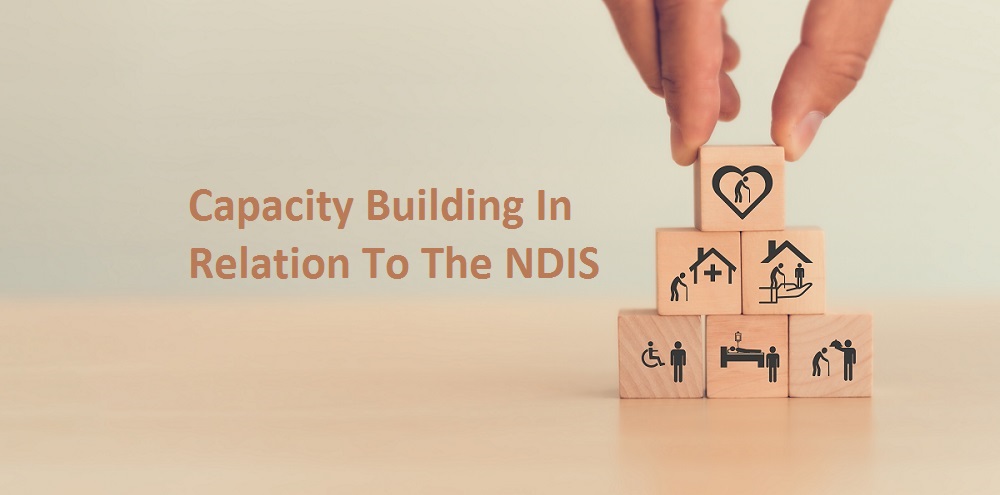What Is Capacity Building In Relation To The NDIS & Why Is It Important?

One of the most common questions about NDIS services is about the term ‘capacity building’ – what does it mean, what are its objectives, and what are its outcomes? Those with long-term goals may look into capacity building to help them live a richer, more independent and more fulfilling life. So what is NDIS capacity building, and how does it differ from day-to-day core support services?
Unlike core support services, which are there to assist you with your daily activities, capacity building supports are all about helping you reach a point where you no longer need certain support services. So for example, a core support service might prepare and deliver your meals to your home, whereas building capacity to make your own meals may be a better long-term goal for you. It therefore focuses on building your skills and abilities to reduce support worker contact and perform daily living activities for yourself. This has been found to greatly improve people’s sense of independence and fulfillment.
Capacity building NDIS services can be broken down into nine subcategories. Below is a list of these categories and what outcomes to expect by engaging with their associated services:
1. Support coordination
Support coordination involves assisting individuals in finding appropriate service providers, developing skills to understand what to look for in a provider, maintaining relationships with providers and support workers, booking and tracking support services, recognising good quality services, and making a complaint if necessary
2. Improved living arrangements
Improved living arrangements involve helping individuals find their own accommodation, accompanying them to view rental properties, teaching them what to look for in a home, providing guidance on rental agreements and contracts, and offering advice on questions to ask real estate agents or homeowners.
3. Increased social and community participation
Community participation empowers individuals to have more contact and inclusion in their community. For example, it may include helping individuals join a local sporting or leisure club, attend social events, develop social skills, connect with others in the community, attend or find support groups, attend gyms or fitness classes, and participate in other fitness venues or classes.
4. Finding and keeping a job
Finding and keeping a job involves learning how to write a resume and cover letter, practicing interview questions through role-play, having a support worker attend interviews, and developing basic computer and administration skills to aid in job searching.
5. Improved relationships
Improved relationships involve seeking assistance from a psychologist to understand emotions, learning to read social cues and body language, managing personal behaviors, and developing social skills through positive behavior support to enhance social interactions.
6. Improved health and wellbeing
Improving health and wellbeing involves a multi-faceted approach that includes learning how to prepare healthy meals, understanding the type of physical activity that is appropriate for maintaining health and fitness, seeing a nutritionist or dietician for personalised meal plans and food advice, and working with a personal trainer to achieve fitness goals and improve strength and mobility.
7. Improved daily living
Improving daily living can be achieved through various therapies such as physiotherapy and occupational therapy that aim to enhance physical capabilities and improve personal care and daily living tasks.
8. Improved life choices
Improving life choices involves acquiring financial management skills, assistance with NDIS plan budgeting and funding, and developing the capability to self-manage your NDIS plan.
9. Improved learning
Improving learning involves enrolling in a TAFE or university program, learning effective study skills, receiving support for attending lectures or classes, and participating in study groups and contributing to group assignments.
These NDIS capacity supports examples cover an extremely broad range of desired outcomes for people with all kinds of disability, and many of these categories feature psychosocial recovery coaching for people with mental health diagnoses. You will work with your occupational therapy professional or psychologist through your NDIS plan to determine which support category (or categories) is best suited to achieving a long-term goal.
St Jude’s Mainstream Capacity Building Program
We are proud to offer this program that aims to stimulate and encourage change in the delivery of mainstream services through the development and trialing of new, more inclusive approaches.
Our Mainstream Capacity Building program is available in the South West of WA to help with the many challenges of living in remote areas with disability, in particular for people with psychosocial disability. This program will engage an Allied Health Consultant to deliver a ‘map and gap’ exercise which identifies roadblocks to service accessibility.
The project has created and implemented a strategic plan which offers practical solutions to overcome these barriers, provide support with all stages of transition, forge stronger links between existing services, and support individuals living with disability to access services available under the NDIS.
How Do I Access Capacity Building Support Services?
All of these capacity building support options are available through your NDIS funding. As an experienced and trusted provider of NDIS disability support services, St Jude’s is dedicated to getting people active in the community and living better. Allow us to let us help you build your skills so you can further your independance and create better relationships and personal outcomes for yourself.
|
|


